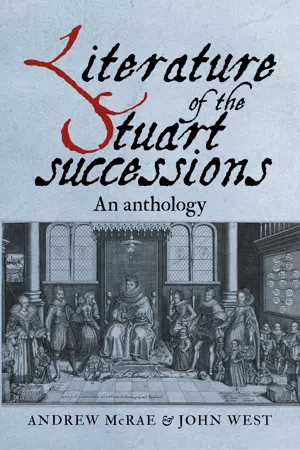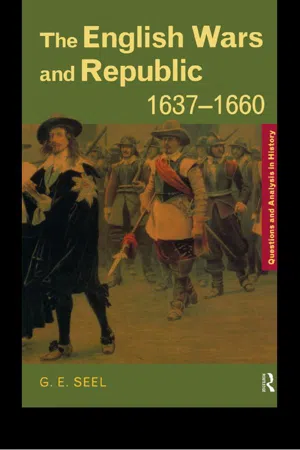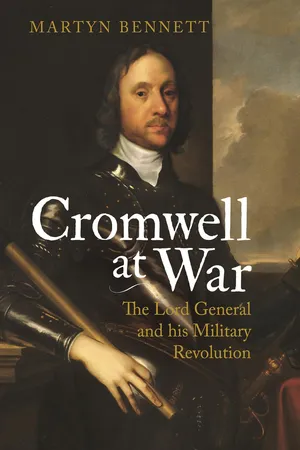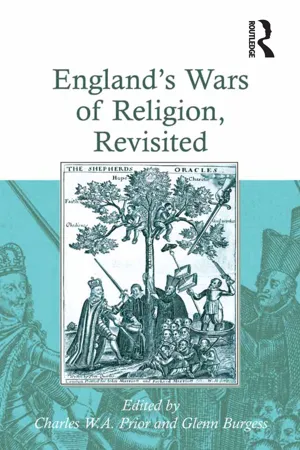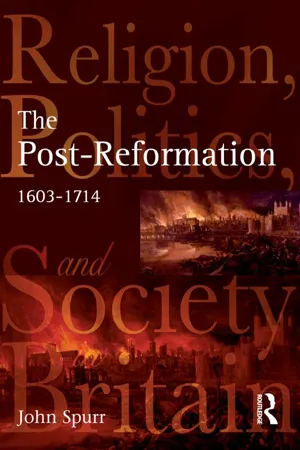History
Oliver Cromwell
Oliver Cromwell was a prominent political and military leader in 17th century England. He played a key role in the English Civil War, leading the Parliamentarian forces against the Royalists. After the execution of King Charles I, Cromwell became Lord Protector of the Commonwealth of England, Scotland, and Ireland, effectively ruling as a dictator until his death in 1658.
Written by Perlego with AI-assistance
Related key terms
5 Key excerpts on "Oliver Cromwell"
- eBook - ePub
Literature of the Stuart successions
An anthology
- Andrew McRae, John West(Authors)
- 2017(Publication Date)
- Manchester University Press(Publisher)
Part III: 1653 and 1658Passage contains an image
Introduction
The installation of Oliver Cromwell as Lord Protector of the Commonwealth of England, Scotland and Ireland was a key event amid one of the most unpredictable periods in British political history. On 30 January 1649, Charles I was executed after a trial in which he was condemned as a tyrant, traitor and murderer. Shortly afterwards the monarchy was abolished and a republic was declared. Cromwell, who saw the trial and execution of the King as an act of divine justice, was Lord General of the army in these years, and he led the republic’s fight against Royalist insurgency in Ireland, Scotland, and England. The ruthlessness with which he prosecuted some of these campaigns, especially in Ireland, remains controversial to this day. Victories over Charles Stuart’s forces at Dunbar on 3 September 1650 and at Worcester on the same date in 1651, however, dashed Royalist hopes of a swift Stuart restoration.From this point, attention shifted from military to political matters and in particular the question of how to secure a lasting settlement. The life of the republic was characterized by frictions between moderate MPs and the reformist zeal of the army. Frustrated by the Rump Parliament’s resistance to reform, Cromwell expelled it in April 1653. It was replaced in July by the Nominated Assembly, a group of 140 new MPs selected by Cromwell and his Council of Officers. As with the Rump before it, however, divisions between moderates and radicals over political and religious reform led to its downfall. On the morning of 12 December 1653, MPs voted to yield their authority to Cromwell. Four days later he took the title of Protector at a ceremony at Whitehall, described in the newsbook Mercurius Politicus below (III.1 ).The Protectorate faced a number of immediate challenges. England was at war with the Dutch. Royalist plots were a constant threat. The Protectorate also faced opposition from republicans and radical religious groups for whom Oliver’s acceptance of the title of Protector elevated him to a position of quasi-regal authority. This was perceived as a betrayal of everything that had been fought for in the past decade. Attacks on Cromwell proliferated, from both Royalists and republicans. He was condemned as a tyrant, mocked as a false king and ridiculed for his appearance: Cromwell’s nose was one of the most common features of satirical verse in the 1650s. But there were, equally, defences of him as an active ruler guided by providence far beyond what any king could be. As Andrew Marvell put it: ‘For to be Cromwell was a greater thing, | Than ought below, or yet above, a king’ (see III.3 - eBook - ePub
- Graham E. Seel(Author)
- 2005(Publication Date)
- Routledge(Publisher)
In the second session of Cromwell’s Second Parliament (20 January-4 February 1658) the Protectorate once again ran into difficulties. The excluded members returned and vented their anger at their earlier treatment and at what they perceived to be the apostasy of Oliver Cromwell, his betrayal of the Good Old Cause. In other words, they resented Cromwell’s apparent abandonment of everything for which he and his supporters had fought since 1642 —including, latterly, the republican ideals articulated in 1648/9—in return for his elevation as ‘a king in all but name’. By the time of his death on 3 September 1658 he was thus reviled alike by the republicans and Royalists, the former believing him to be a traitor and the latter seeing him as a usurper.ANALYSIS: IS IT POSSIBLE TO DESCRIBE THE PROTECTORATE OF Oliver Cromwell AS A MILITARY DICTATORSHIP?
Ever since his own time the popular impression of Lord Protector Oliver Cromwell has been that of a despotic autocrat, an ‘absolute Lord and Tyrant’.1 The Restoration unleashed a flood of such opinion, one author choosing to call his subject ‘The English Devil’. Another, in a tract published in 1682, concluded that the Protectorate had been a time of ‘Tyranny, Oppression and Injustice’ perpetrated by Cromwell, who ‘ruled by himself with greater power and more absolute Sway than ever any Monarch of England did’.2 Moving forward in time, the emergence of the European dictatorships of the twentieth century led, perhaps inevitably, to comparisons between, on the one hand, Oliver Cromwell, and, on the other, Hitler, Mussolini and Stalin. For instance, W.C. Abbott, in his Writings and Speeches of Oliver Cromwell, drew parallels between his subject and Hitler.3 Meanwhile, in the Saturday Review in 1934, Clive Rattigan described Cromwell as ‘a 17th-century Hitler-Mussolini, rolled into one’.4 More generally, H.N.Brailsford, writing in the 1960s, believed that the Protectorate amounted to ‘a totalitarian dictatorship’ and that ‘the efficient police state which Thurloe constructed was as highly centralised as any of the totalitarian regimes of our own century’.5 However, the most recent research has concluded that ‘the picture of Cromwell as an all-powerful, unfettered autocrat who knew no constitutional restraints, and of his Council as a politically impotent façade, overawed, manipulated or ignored by a tyrannical Protector, is fundamentally inaccurate’.6 - eBook - ePub
Cromwell at War
The Lord General and his Military Revolution
- Martyn Bennett(Author)
- 2017(Publication Date)
- I.B. Tauris(Publisher)
1 CROMWELL THE MAN For most of his life Oliver Cromwell lived away from the public gaze. Not only did he not play any role in military affairs before 1642, for much of his life he held only minor public office and even then this was sporadic rather than constant. Only partly was this due to the social position into which he was born – sometimes it was because of the precarious nature of his status when an adult, and sometimes due to Cromwell's own failings when in office. Looking back on his life, when he was the Lord Protector, Cromwell rightly said of his origins that he was ‘by birth a gentleman living neither in any considerable height, nor yet in obscurity’. 1 It was quite an apt description of the station he was born into, and like each social stratum in life his carried certain obligations. Following the death of Cromwell's father and Cromwell reaching the age of 21, and even more so once he was married, there were major family obligations. He had seven sisters and would go on to have a large number of children of his own, and in the 1620s there were the requirements of urban government to attend to. Whilst familial duties remained with Cromwell all of his life, a drop in social status in his early thirties meant a hiatus in socio-political obligations for several years. The rules and regulations of military life were something which did not impinge upon Cromwell until after he was 43 years of age. By then his public and political life had accelerated rapidly beyond the confines of small-town eastern England and even the university town of Cambridge, where he had become an MP at the age of 40 - eBook - ePub
- Glenn Burgess, Charles W. A. Prior(Authors)
- 2016(Publication Date)
- Routledge(Publisher)
Chapter 10Oliver Cromwell on Religion and Resistance
Rachel FoxleyIn the essay from which this volume takes its starting point, John Morrill argued that the English Civil War ‘was not the first European revolution: it was the last of the Wars of Religion’.1 This influential claim was fleshed out by various lines of argument within Morrill’s work, particularly in the analysis of the events of the first two years of the Long Parliament and the watershed moments and issues which divided the elite into the warring sides. A recognition of the crucial importance of religion in the causes of the war has remained widely current in the literature, taking different forms in the work of revisionists and post-revisionists. The evidence that religious alignment was critical to the political choices of many, especially the most highly motivated minority, at all levels of society, is overwhelming.2 The prime exemplar of religious motivation in the fighting of the Civil War is Oliver Cromwell himself: so deeply, consistently and quotably Puritan in his interpretation of the war that there seems little further to be said. And yet Cromwell denied that religion was a legitimate ground for resistance, and insisted that the Civil War was being fought for civil liberty rather than for religion. By taking that assertion seriously, I will attempt here to bring Cromwell’s providentialism back into relation to his constitutionalism, suggesting that the relationship between the two is less contradictory and more mutually supporting than might be supposed.We must distinguish between several senses in which the Civil Wars and the arguments associated with them might be characterized as religious. Firstly, the wars might have been seen as religious by those who fought and suffered in them because they were seen as an event in the unfolding of spiritual history, playing a role in the providential purposes of God. Secondly, we might see the motivations - eBook - ePub
The Post-Reformation
Religion, Politics and Society in Britain, 1603-1714
- John Spurr(Author)
- 2014(Publication Date)
- Routledge(Publisher)
14 The plea fell on deaf ears and Parliament fell on the Instrument. Although Cromwell forced out eighty or so of its most determined critics, the remaining MPs took apart the Instrument and produced their own constitution. Among other changes, their bill proposed narrower limits to religious freedom, and parliamentary control over the army. Cromwell and the Council could accept cuts in the number of troops and in funding, but would never surrender control of the army. An exasperated Protector dissolved Parliament at the first plausible opportunity. It had not passed a single piece of legislation.In 1655 the Cromwellian government sank into what Coward has characterised as a ‘siege mentality’. It had become obvious to the Protector that the majority of the population ‘are persons disaffected and engaged against us’, a gloomy realisation that was underlined by what Josselin described as ‘the great noise of plots’.15 Frequent rumours of assassination plots and planned risings by royalists, Levellers and disaffected officers were reaching Thurloe, Cromwell's secretary and spymaster, in the mid-1650s. Thanks to Thurloe's network, the government was prepared for any trouble that did occur and easily snuffed out the royalist Penruddock rebellion in Wiltshire in March 1655. The news from overseas was equally dispiriting: although the godly knew that the malign forces of popery were always active, the massacre of the Vaudois Protestants in the Italian Alps by the Catholic Duke of Savoy in May 1655 shocked and angered the Cromwellians; the reports that arrived later that summer of the failure of the Western Design, a naval expedition against the Spanish West Indies, threw Cromwell into a spiritual and psychological crisis. The Protector was convinced that God had turned against him and that some terrible sin needed to be expiated if divine favour was once again to shine on England. ‘The Lord help us to know what our sin is, or his pleasure is, that we are so crossed and visited in Jamaica,’ prayed James Berry, a godly officer.16 ‘We live in changeable and uncomposed times,’ observed one preacher at St Paul's in June; ‘we see distempers at home, we hear of distresses abroad; the Lord is shaking heaven and earth, churches and states.’17
Learn about this page
Index pages curate the most relevant extracts from our library of academic textbooks. They’ve been created using an in-house natural language model (NLM), each adding context and meaning to key research topics.
